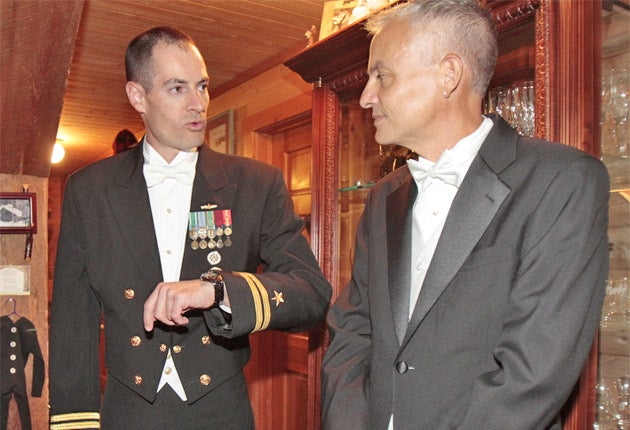Gay rights victory as don't ask, don't tell comes to an end
Despite the nuptial celebrations, there are still hurdles to full equality

The very last thing that US Navy Lieutenant Gary Ross did before exchanging marriage vows with his partner Dan Swezy early yesterday was to check his wristwatch. It was the stroke of midnight.
Fifteen minutes earlier, the couple had walked into a log cabin at Moose Meadow Lodge, a hillside bed-and-breakfast in rural Vermont. Ross wore full dress uniform. Swezy was in white tie. "This," said the Justice of the Peace who presided over the ceremony, "is Gary's official coming out."
That was one way of putting things. The happy couple, who are 33 and 49 respectively, tied the knot just seconds after the repeal of Don't Ask Don't Tell [DADT], the notorious law which has since the mid-1990s made it illegal for gays and lesbians to serve openly in the US armed forces.
They had travelled several thousand miles east, from their home in Tucson to become the first military couple to take advantage of their right to tie the knot. Vermont is the most easterly of the six US states that allow gay marriage, so the clock struck midnight earlier there than it would have in any alternative wedding location."I think it was a beautiful ceremony. The emotions really hit me... but it's finally official," Lt Ross told reporters afterwards. "We are thrilled that the policy is gone."
Though Ross said that "anyone with moderate perception" could probably have figured out his sexuality, he has been forced to keep his partnership with Swezy – who is a civilian – completely secret throughout the 11 years that they have been together. Had Ross told colleagues that he was in a same-sex relationship, his faithful service would have been unceremoniously brought to a halt. Had he been killed or wounded in combat, Swezy would neither have been officially informed, nor given any of the normal rights or compensation due to a bereaved partner.
"It requires you to lie several times a day," Ross said, regarding the old system. "Being in the military is extremely invasive [so] it becomes a web of excuses you make when you try to be as honest as possible but you can't be honest."
The formal repeal of DADT yesterday represents one of the most progressive gestures of Barack Obama's time in office, and brings the US in line with most other developed nations. It was achieved despite stiff opposition from conservatives, who argue that allowing gays and lesbians to serve will undermine the order and discipline essential to the effectiveness of the armed forces.
It remains to be seen whether that will be the case. Yesterday, as the Pentagon began formally accepting job applications from homosexuals, military leaders said that at least 97 per cent of the million-odd members of the armed forces had undergone training in the new law. They are confident it will not have any serious impact on everyday operations.
A slew of closeted soldiers duly took advantage of their newfound ability to acknowledge their sexuality. Several contributed personal stories to Outserve, a new magazine aimed at gay and lesbian members of the military. Eddy Sweeney, an Air Force intelligence officer, told the publication that he was celebrating the end of "a destructive life of deception, lies, and evasion with myself and the Government of the United States of America".
Josh Seefried, another airman, said that he was hopeful that his colleagues would embrace the news of his homosexuality. "You take a chance and you have to hope everything is OK. I think everything is going to be more than OK," he said. "That kind of family-ness I see in the Air Force, that is going to be mine, too."
There are still several hurdles to overcome before gay rights advocates can celebrate full equality in the US armed forces, though. Although same-sex partners will be entitled to become life insurance beneficiaries of serving troops, a move to allow them to receive military health insurance (in common with heterosexual partners) has been blocked. They also have been denied access to military support groups while their spouses are overseas.
Even thornier is a proposal that would have allowed Navy chaplains to conduct same-sex marriage ceremonies in states where it is illegal. That has been put on ice while the Pentagon decides.
Join our commenting forum
Join thought-provoking conversations, follow other Independent readers and see their replies
Comments
Bookmark popover
Removed from bookmarks